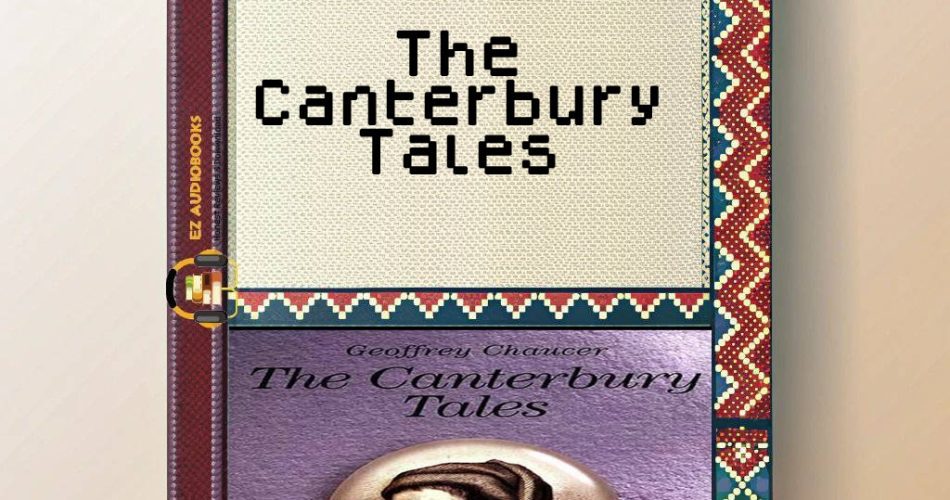Audiobook Sample
Listen to the sample to experience the story.
Please wait while we verify your browser...
- Title: The Canterbury Tales
- Author: Geoffrey Chaucer
- Narrator: Various
- Length: 19:27:00
- Version: Abridged
- Release Date: 01/01/2011
- Publisher: LibriVox
- Genre: Fiction & Literature, Historical Fiction
- ISBN13: SABFAB9780576
As I press play on this LibriVox recording of “The Canterbury Tales”, the crackling voices of multiple narrators transport me back to my graduate school days at Oxford, where I first encountered Chaucer’s Middle English in a musty seminar room. The memory of struggling through “Whan that Aprille with his shoures soote” with my Norton Anthology propped against a library carrel makes me appreciate anew the accessibility of this free audiobook version.
The frame narrative – that ingenious device of pilgrims telling stories while journeying to Canterbury – unfolds with renewed vitality in audio format. The varied narrators (a necessity for this volunteer-produced recording) create a delightful cacophony of medieval England. While some voices are more polished than others, the collective effect surprisingly enhances the text’s democratic spirit. The Wife of Bath’s boisterous prologue particularly benefits from this approach, her voice leaping from my headphones with bawdy energy that would make my prim medieval literature professor blush.
Chaucer’s social satire emerges with particular clarity in audio form. Listening to the Pardoner’s tale while walking through modern London’s financial district, I was struck by how his sermon against greed resonated with the glass towers around me. The audio format makes these timeless themes vibrate with contemporary relevance. The Merchant’s bitter marital complaints and the Franklin’s idealized vision of partnership create a fascinating dialectic about medieval marriage that still echoes in today’s relationship debates.
What makes this audiobook special is how it handles Chaucer’s linguistic playfulness. While purists might prefer a single professional narrator, the multiple voices highlight the text’s inherent multivocality. The transitions between tales become genuine shifts in perspective, each narrator bringing distinct character to their assigned pilgrim. The Miller’s crude tale benefits from a rougher, more colloquial delivery, while the Knight’s romance shines when read with deliberate courtly cadence.
Some technical limitations must be acknowledged. The audio quality varies between sections, and the Middle English pronunciation isn’t always consistent. Yet these imperfections strangely mirror Chaucer’s own unfinished masterpiece – a work that invites us to engage with its gaps and contradictions. For students encountering the text for the first time, I’d recommend following along with a modern English translation during particularly challenging passages.
Compared to other medieval frame narratives like Boccaccio’s “Decameron”, Chaucer’s work gains unique dimensions in audio format. The pilgrimage framework creates a natural rhythm for listening – perfect for breaking into segments during one’s own daily journeys. I’ve taken to listening to one tale each morning during my commute, finding that the Parson’s sober sermon hits differently in rainy traffic than the Summoner’s scatological humor does on sunny afternoon walks.
This audiobook particularly illuminates Chaucer’s subtle gender commentary. The contrast between the prim Prioress and the bold Wife of Bath becomes even more striking when heard in succession. I’m reminded of teaching this text last semester, when a student pointed out how the audio performances made her hear the female characters’ speeches as active resistance rather than passive acceptance of medieval patriarchy.
For those daunted by Middle English, this free audiobook provides an invaluable bridge to Chaucer’s world. The narrators’ expressive readings help decode unfamiliar pronunciations, making the text’s musicality accessible. I only wish the collection included more scholarly notes – though this absence does encourage listeners to engage their own interpretative faculties, much like Chaucer’s original audience must have done.
The unfinished nature of “The Canterbury Tales” becomes particularly poignant in audio format. When the recording ends abruptly after the Parson’s Tale, we’re left with the same tantalizing incompleteness that has fueled six centuries of scholarship. It’s a reminder that all literary journeys – whether pilgrimages to Canterbury or listenings through headphones – are as much about the travel as the destination.
Yours in literary pilgrimage,
Prof. Emily Chen

